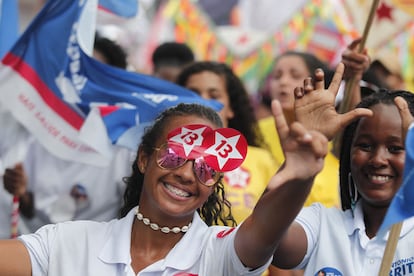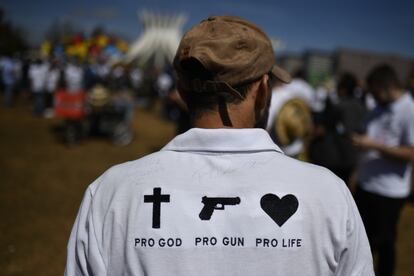The Brazilian partisan divide: How the haves and have-nots will vote in the presidential election
Stark political polarization clearly delineates the electoral bases of Lula da Silva and Jair Bolsonaro


One voting bloc is mainly composed of the have-nots – Black people, women, youths and voters from the northeast. The other is mainly composed of the haves – white people, men, people over 60, the well-educated, evangelicals and voters from the north. The former will mostly vote in Brazil’s October 2 presidential election for the Workers’ Party (PT) candidate, Luiz Inácio Lula da Silva. The latter will mostly vote to reelect the current president, Jair Bolsonaro. Political polarization in Brazil is such that voters rarely venture out of their hermetic partisan camps. The Lula camp yearns for the days when the former president presided over the 2001-2008 economic boom, when the poverty rate dropped from 33% to 15.5%. The Bolsonaro camp views the PT leader as the very incarnation of evil communism, and doesn’t hesitate to remind the country that Lula spent more than 500 days in prison for corruption. The two camps share no common ground.
“We have a conspicuous partisan divide in Brazil, and the PT has a very strong identity and brand,” said Claudio Couto, a political scientist with the Getulio Vargas Foundation. “This entire electoral process has been about whether you’re pro-PT or anti-PT. And although there has always been a split between rich and poor, it wasn’t as marked as it is now,” he said.
The various polls conducted in Brazil throughout the 2022 electoral campaign reveal the voter profiles that we see today. In May, independent pollster Datafolha surveyed voters by age, origin, sexual orientation and educational achievement. It found that 55% of low-income voters, 60% of Black or mixed-race voters, and 70% of homosexuals or bisexuals will cast their ballots for Lula. People living in the northeast are 67% more likely to vote for the former president.

The majority of Bolsonaro’s supporters are on the opposite side of the aisle: 43% earn higher incomes, 38% are white, 49% are evangelical Christians, 26% are over 60 and only 26% are younger than 24, almost the exact opposite of Lula’s supporters. The gender divide is also very clear: 36% of the women surveyed said they intend to vote for Lula, while only 16% said they would vote for Bolsonaro.
“Lula’s support among the poor is closely linked to the social policies he implemented during his presidency, which were very beneficial for this sector of the population. The poorest of the poor were able to get decent housing, electricity service, scholarships and welfare payments. They remember those good times very well,” said Couto. “Bolsonaro, on the other hand, has a negative attitude toward social policies. He only began to make welfare payments during the runup to the elections, which was seen as opportunistic political patronage, especially among the poorest Black people and mestizos.”
The current president’s support among well-off Brazilians has more to do with their historical antipathy for the PT than an endorsement of Bolsonaro’s policies. This anti-PT stance has become even more intransigent, says Couto, because “there is a sense that social distinctions eroded when the poor gained some social mobility during the PT’s time in power.”
Datafolha also conducted surveys about gun control, confidence in electronic voting systems and pandemic-related fears that again reinforced the ideological rift between the candidates. Eighty percent of Bolsonaro’s supporters said that the armed forces should be involved in tallying the vote, demonstrating that the president’s campaign rhetoric slamming electronic voting systems and raising the specter of electoral fraud is resonating with his base. Half of the Bolsonaro followers surveyed agreed or strongly agreed with the statement, “an armed people will never be enslaved.” The same number considered that their economic circumstances had improved in recent months. Lula’s base is a study in contrast: they don’t want guns, they believe that Brazil’s voting systems are secure, and feel that their economic circumstances have deteriorated during the Bolsonaro administration.
The latest polls predict that Lula will win in the first round of voting on October 2 with more than 50% of the vote. If he fails to top that threshold, Lula and Bolsonaro will face off again in a runoff vote on October 30.
Tu suscripción se está usando en otro dispositivo
¿Quieres añadir otro usuario a tu suscripción?
Si continúas leyendo en este dispositivo, no se podrá leer en el otro.
FlechaTu suscripción se está usando en otro dispositivo y solo puedes acceder a EL PAÍS desde un dispositivo a la vez.
Si quieres compartir tu cuenta, cambia tu suscripción a la modalidad Premium, así podrás añadir otro usuario. Cada uno accederá con su propia cuenta de email, lo que os permitirá personalizar vuestra experiencia en EL PAÍS.
¿Tienes una suscripción de empresa? Accede aquí para contratar más cuentas.
En el caso de no saber quién está usando tu cuenta, te recomendamos cambiar tu contraseña aquí.
Si decides continuar compartiendo tu cuenta, este mensaje se mostrará en tu dispositivo y en el de la otra persona que está usando tu cuenta de forma indefinida, afectando a tu experiencia de lectura. Puedes consultar aquí los términos y condiciones de la suscripción digital.








































